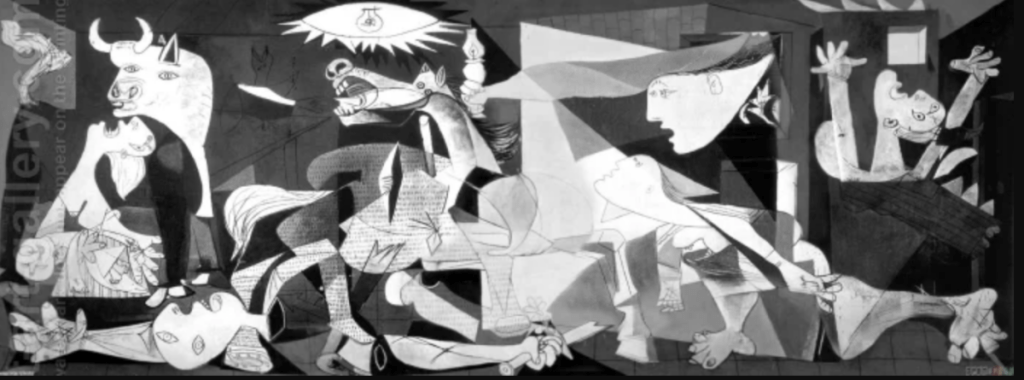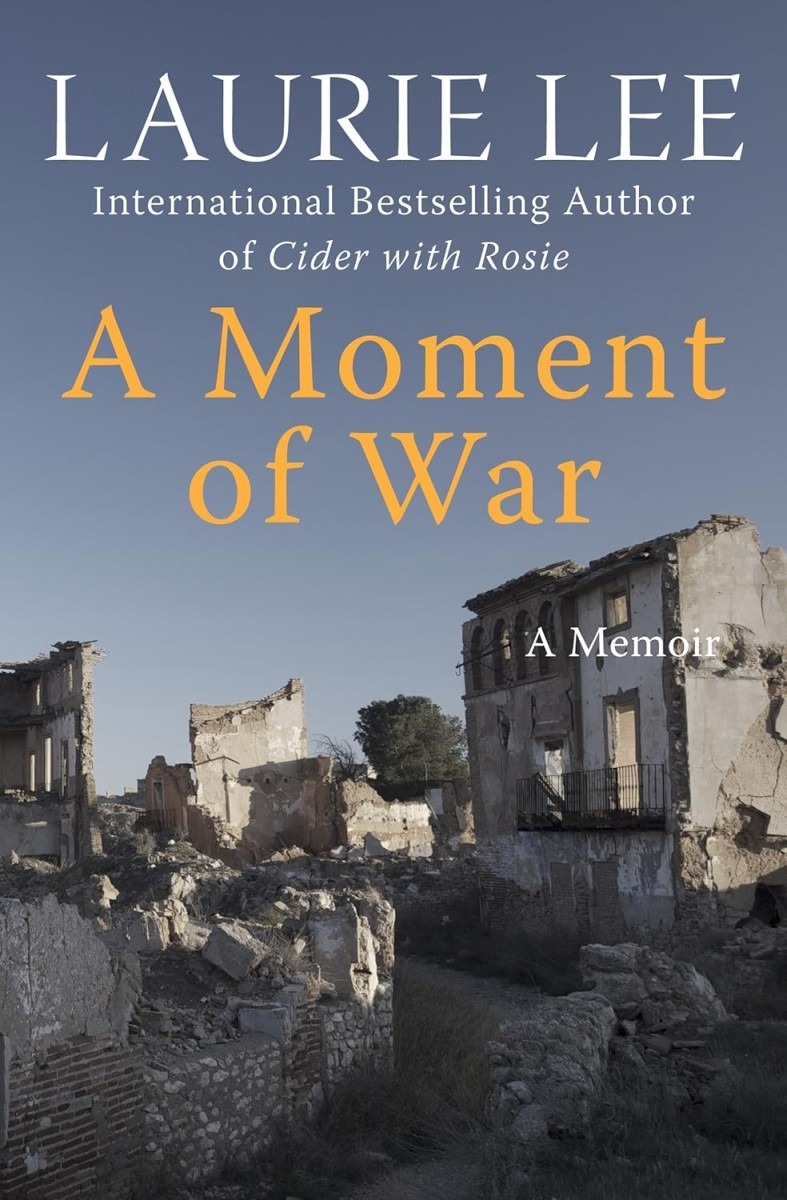This is book three in the three part series starting with Cider with Rosie followed by As I Walked Out One Midsummer Morning. This book is a memoir of the authors experiences during the Spanish Civil War, something I knew of, but not much about. There where the Fascists lead by Franco who supported traditionalism and the Catholic Church against the Republicans who were comprised of Socialists, Communists, Anarchists and those against the church.
I find that given my education in America I have a knee-jerk reaction due to indoctrination against things the Republicans stood for, but also an aversion to Fascism given WWII. I’d like to address two items that come to mind when considering this. The first is what is happening right now in America looks eerily similar to what is happening in the USA right now. Trump is trying to remove democracy which is something I could never have fathomed would happen in the USA until the last few years. But I guess there are precedents and history rhymes.
The second aspect is I now understand the ripples from this time that continue to our modern times. Europe is more socialist than the USA and I believe a major factor is simply because they are much older and that is the course economies will naturally take. I learned that the poor were still effectively ‘serfs’ like in medieval times, not owning their own land and not being able to build wealth. This system hadn’t changed much since Roman times and so socialism/communism would have seemed like a great idea when you’ve spent your life making the Duke, or whatever aristocrat more wealthy when you’ve spent you’re entire life along with the rest of the village.
Here in the USA we can see something vaguely familiar due to the wealth disparity which has skyrocketed since the Reagan presidency. The system is stacked in favor of the wealthy and should it continue on this course then history tells us it always ends in revolution, toppling over like a Jenga game where the bottom is hollowed out as more pieces end up on top. It’s true we’re not exactly serfs but the middle class has been hollowed out in search of profits going to the top and research shows the young can no longer expect to be better off than their parents. So what did we get? We got a populist demagogue in Trump channeling that anger. Again, it is different from pre-Civil War Spain but it definitely rhymes.
Along with understanding why Europe is more socialist I also have a better understanding of various movements in Spain I saw when studying there. My own host brother was so into Anarchy, and the bands we listened to, especially SKA-P always spoke about the rich exploiting the workers with one of the lyrics being “we have to sweat and sweat to just buy bread.” You can see this clearly from the cover of the album. They played this at La Marea in Toledo Spain (which no longer exists) and although we really didn’t understand the political message it was a great song to dance to.
My host brother was attracted to what I had thought was just middle class, youth angst but I learned its origins are in the Civil War and many of those Republican leanings persist to this day. I saw anarchy graffiti everywhere along with workers rights propaganda and so on. In addition I’ve learned that the debate on Franco’s legacy continues. The Franco regime ended in 1977 and now there is discussion to remove many of the Fascist monuments in public places as those older rebels die off.
I guess I had always thought that there would be a march towards improvement as education became more accessible. What I’m starting to understand is societies move in some type of rhythm kind of like waves on an ocean. There are peaks, valleys and the occasional sneaker which wipes out everything on the beach and then even tsunamis which destroys everything. I imagine there could be a mathematical equation to explain this as societies do not move in a straight line of improvement. If there were I would have bet on the USA but that certainly isn’t the case in these perilous times when Republicans outright threaten Civil War.
Now on to my highlights and notes:
I was at that flush of youth which never doubts self-survival, that idiot belief in luck and a uniquely charmed life, without which illusion few wars would be possible.
My parents always told me when I was young, “I know you think you are invincible but….” It was true and remains true, young people do not have enough experience to understand we are quite frail to all the things that could kill us. Adults have more experience and likely have seen death so are much more cautious.
the chance to make one grand, uncomplicated gesture of personal sacrifice and faith which might never occur again. Certainly, it was the last time this century that a generation had such an opportunity before the fog of nationalism and mass-slaughter closed in.
Youthful idealism.
Few acknowledged at the time that it was General Franco, the Supreme Patriot and Defender of the Christian Faith, who allowed these first trial-runs to be inflicted on the bodies of his countrymen, and who delivered up vast areas of Spain to be the living testing-grounds for Hitler’s new bomber-squadrons, culminating in the annihilation of the ancient city of Guernica.
Incredible that a son of Spain would invite destruction of his own country by a foreign power. I suppose winning was everything to Franco and so any help was greatly appreciated. This is what inspired Picasso to paint his famous “Guernica.” My favorite story was the Nazis asked him if he were “responsible for this painting,” to which he replied, “No, you are.”

Chief sufferer, of course, was the ancient church, whose high-roofed edifice, hacked from red stone, now grimly haunted the plaza. The outside looked blind, blank and faceless, but the inside was now bare as a barn – the walls and little chapels cleared of their stars and images, the altar stripped, all the vestments gone. I couldn’t help being reminded of our own Civil War, and of Cromwell’s followers hatcheting the faces of the old stone saints, and stabling their horses in churches.
Two revolutions against an ancient structure with different outcomes. England now has their own church which retains the theology but divests itself from Rome. Spain on the other hand has Catholicism in its DNA so while the religion is still part of the culture, most Spaniards are not ‘practicing’ Catholics. AI tells me only 16% are ‘practicing’ but 52% identify as Catholic. I’ve attended mass in many wonderful, ancient churches and cathedrals and those sitting in the pews are either old or foreign with the total being extremely sparse of perhaps only 24 people at most.
All over Republican Spain now such churches as this – which had stood for so long as fortresses of faith commanding even the poorest of villages, dominating the black-clad peasants and disciplining their lives and souls with fearsome liturgies, with waxteared Madonnas and tortured Christs, tinselled saints and gilded visions of heaven – almost all were being taken over, emptied, torn bare, defused of their mysteries and powers, and turned into buildings of quite ordinary use, into places of common gathering. But in this particular occupation of Tarazona’s main church, I noticed something else. The soldiers who made free with these once holy spaces were a little more than normally loud and hearty, whereas the local villagers, who had perhaps regularly heard Mass here and spoken their darkest secrets in confession, now showed half-timid, half-shocked at what they were doing, and broke out at times into short bursts of hysteria like unchecked children amazed at their wantonness.
The people wanted to be free of thousands of years of Church dominance but had a very hard time actually doing it. In the end religion returned but has been dying a slow death becoming a relic of the past kept alive by tourists.
There were certainly those who cursed the little bleeder, but the Brigade was proud of its bugler; he was no brash, brassy, spit-or-miss blaster of slumber, but one who pitched his notes carefully to the freezing stars and drew them out like threads of Venetian glass. I got to know about him later. He was not exactly a soldier but a thirteen-year-old choirboy from Cuenca. Our Commander had heard him, kidnapped him, destroyed his papers of identity, and brought him as a pampered prisoner to Tarazona.
Incredible what happens during war. Humanity considers itself enlightened but during times of war returns to primitive savages.
Did we know, as we stood there, our clenched fists raised high, our torn coats flapping in the wind, and scarcely a gun between three of us, that we had ranged against us the rising military power of Europe, the soft evasions of our friends, and the deadly cynicism of Russia? No, we didn’t. Though we may have looked at that time, in our wantonly tattered uniforms, more like prisoners of war than a crusading army, we were convinced that we possessed an invincible armament of spirit, and that in the eyes of the world, and the angels, we were on the right side of this struggle. We had yet to learn that sheer idealism never stopped a tank.
It is very hard to see the forest from the trees and to use another metaphor, hindsight is twenty twenty. As I use these I think of Don Quixote becoming upset with Sancho for using too many proverbs.
Franco had said that he was willing to wipe Madrid from the earth rather than let it remain ‘in the hands of the Marxists’. So he gave it up to the Luftwaffe, who were interested to see what mass-bombing could do to a major European city.
Was this then what I’d come for, and all my journey had meant – to smudge out the life of an unknown young man in a blur of panic which in no way could affect victory or defeat?
The author killed a man. He is right, there was no purpose other than to violate a law of nature and a commandment that so many who profess a strong faith conveniently ignore. I’ve come to realize that one should never kill. I’ve taken the Buddhist practice of not killing even bugs and if I see a spider in the house will capture and release it outside. I am a hypocrite though because I eat meat. Maybe one day my belief and practice will come into alignment. But to kill or harm a human especially , that feels as though it goes against some sacred law of the universe. Again, I’m a hypocrite as we really shouldn’t be killing any living thing.
Compared with dandy, spendthrift Madrid, Barcelona had been the clever, rich uncle, aloof, scarcely Spanish at all.
I enjoy learning about city rivalries. Tokyo/Osaka, Saigon/Hanoi. One of my favorite sayings I learned in Vietnam on this subject.
If you ask a girl in Hanoi, “Could you love me?” She will respond, “What if I say no?”
If you ask a girl in Saigon the same question, she will respond “Why not?”
One city feeling superior to another and sometimes it has to do with historical outcomes of war between the two.
A Moment of War is the third book in a three part series. Here are my highlights and notes of the first two:

2 comments
Comments are closed.